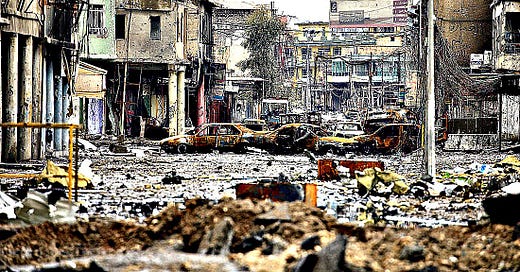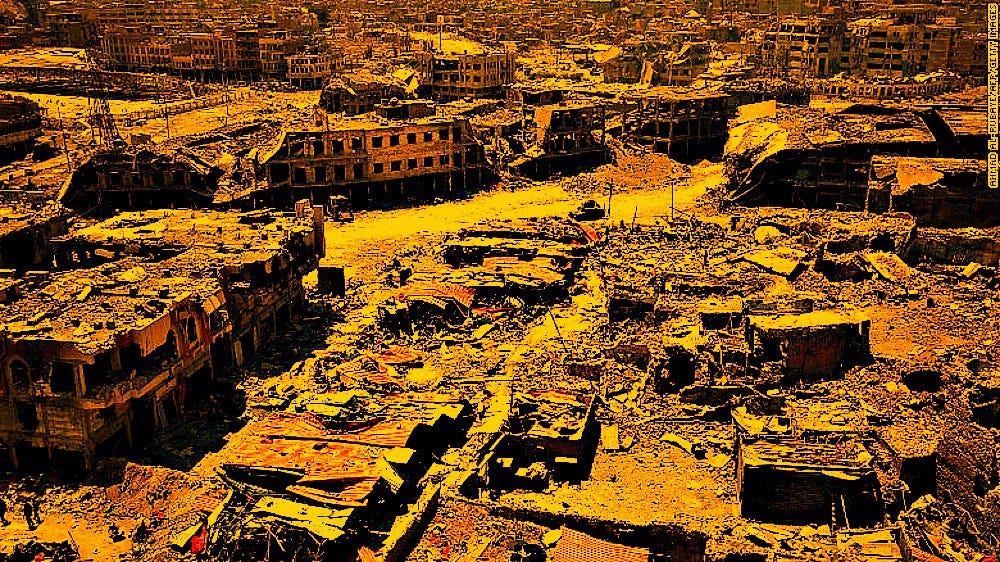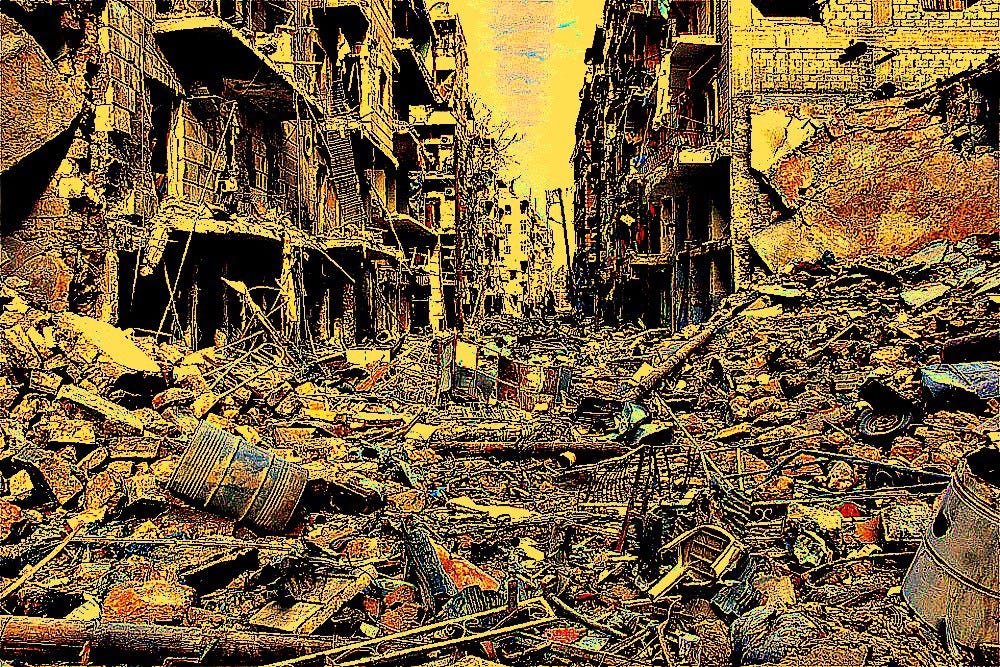What is Wrong With This Picture? Civilian Casualties and the Death of Truth
The truth is military authorities have no idea how many civilians have been killed by American and Australian bombs in the medieval streets of Iraq and Syria.
Millennials obsess and blog endlessly about how they can be better, more socially responsible individuals.
But at the same time as they genuflect before the numerous social justice issues of the day, their taxes are being used to kill mujaheddin, women, children, and the elderly.
And nobody says a thing.
In the background flicker tens ultimately hundreds of billions of dollars of secretive and often questionable military contracts.
And nobody says a word about them either.
The Americans, and by extension their allies, including Australia, learnt only one lesson out of the Vietnam War: how to manipulate public debate and diffuse opposition.
There is no public debate.
There are no marches on the street.
There is no nightly footage of people being massacred or the devastating consequences of conflict.
And there is no knowledge within the broader public of the wars being conducted in their names with their taxes.
Civilian Casualties
For Americans, Australia is a bit like Pluto: it is a long way away and they know little about it.
Yet Australia was the second largest international contributor to the international coalition fighting Islamic State.
There is an increasing backlash with both the nation’s Muslim minority and the nation’s intelligentsia both implacably opposed to the war.
As such, America is proving a very dangerous ally.
Retired Australian diplomat John Menadue, put it thus in his well respected news blog Pearls and Irritations:
We are a nation in denial that we are ‘joined at the hip’ to a dangerous ally that is becoming even more dangerous with the increasing privatisation of the US ‘war complex’ The complex is less and less under civilian control. Arms companies in the US and particularly drone manufacturers have powerful interests and the means to keep the US perpetually at war.
The latest news, that the Australian Defence Department has officially admitted that the country may have been implicated in the deaths of up to 18 civilians in the Iraqi city of Mosul in June of 2017, is likely to be only the tip of the iceberg, experts say.
It should come as no surprise to anyone that Australia is being implicated in a high number of civilian deaths.
In mid-2017, during the time when the acknowledged deaths occurred and Iraq was busy declaring the defeat of Islamic State, there were a spate of international reports on civilian deaths from the Coalition bombing of the Middle East.
UN High Commissioner High Commissioner for the United Nations Human Rights Office, Zeid Al Hussein, claimed airstrikes were a significant factor in causing civilian casualties.
He said he had repeatedly called on Coalition partners “to ensure that military operations complied fully with international humanitarian law, in particular the principles of distinction, proportionality and precaution, so as to avoid or, at the very least, minimize civilian casualties.”
Former Prime Minister Tony Abbott was responsible for dropping 669 bombs on Iraq and Syria between September 2014, when he announced he was taking Australia back into the Iraq War, and September 2015, when he was turfed from office.
The number of bomb drops began to increase immediately after Malcolm Turnbull seized power. The bombs are estimated to range in size between 500 and 2,000 lbs with a blast radius which can take out a city block.
By April of 2017 Turnbull had been responsible for dropping 1,256 bombs.
In May of 2017 the bombing increased still further, with 119 bomb drops on Iraq, a further 106 bombs in June and 104 in July. By the end of the year Islamic State was claimed to have been defeated.
The Defence Department has consistently refused to release any estimates of casualties, civilian or military.
The Coalition of which Australia is a part only officially acknowledges 1,190 civilian deaths from a total of 32,397 bomb drops between 2014 and 2018.
Numerous other commentators number civilian deaths in the tens or hundreds of thousands.
In a Media Vacuum, Nobody Can Hear The Screams
The world is familiar with the haunting scenes from the carpet bombing of Mosul, Raqqa and Aleppo, along with their surrounds.
But these eerily beautiful post-apocalyptic images never come with dead bodies, the sounds of people dying or the stench of thousands of corpses under the ruins.
Footage of children killed or injured as a result of a relentless barrage of Coalition airstrikes has fueled jihad propaganda and anti-American sentiment worldwide. But oddly, almost none of this vivid human pain has made it into the vacuum of Western media coverage.
Australians have been almost entirely ignorant of the conflict conducted in the Middle East with their taxes, and critics accuse the government of conducting what is tantamount to a secret war.
In mid-2017 Human Rights Watch released a report Civilian Casualties Mount in West Mosul.
Belkis Wille, Senior Iraq Researcher with Human Rights Watch, told the author the people coming out of the city were the most severely traumatised she and other aid workers had ever witnessed.
All of the families I speak to have a story about neighbours, loved ones or friends being killed in airstrikes.
The civilians are highly traumatised. Mosul is the largest urban war in modern history. The west of the city and the neighbourhood still under ISIS control are extremely densely populated.
Every direction you look you have hundreds of civilians packed into buildings.
People who come out don’t complain about the horrific three years under ISIS, they complain about the airstrike that killed their family, despite them having made it through those three years.
People have lost entire families, their homes, their livelihoods. They are coming out with absolutely nothing.
Ms Wille said the Iraqi Army had also perpetrated abuses against the Sunni minority with impunity — the exact same conditions which led to the formation of the Islamic State.
This battle is going to have very negative long term consequences for the country. If it’s not ISIS today, then it’s ISIS 2.0 tomorrow.”
All sides talk of God, from the Islamic State ‘martyrs’ to the conquering army to the devastated civilians.
One shell shocked woman cried out as she stumbled across the front line, her grief recorded for posterity by French television:
I have lost five children, there is no God but Allah.
War Crimes
In July of 2017, one month after the acknowledged civilian deaths caused by Australian bombs, Amnesty International released a report titled ‘At Any Cost: The Civilian Catastrophe in West Mosul, Iraq’.
Amnesty spokeswoman Diana Sayed said: “Pro-government forces, including Australia, failed to take feasible precautions to protect civilians during the battle for west Mosul — through launching barrages of indiscriminate, disproportionate and otherwise unlawful attacks, and failing to provide adequate warnings prior to bombardments.”
Then Defence Minister Marise Payne refused to comment on the allegations, provide any details on civilian deaths or even defend Australia’s role in the conflict.
Many Australians are surprised to learn that their country has been involved in extensive bombing of the Middle East.
Former senior Australian ambassador Richard Broinowski, is yet another who believes Australia’s involvement in Iraq to be not just unlawful but tantamount to a secret war.
“The overriding problem is the Australian public is kept in the dark about military operations in the middle east and have been for a very long time,” he says.
He describes the latest admissions by the Defence Department as “highly suspicious”.
“We have had a one year inquiry over one incident on 13 June, 2017.
“There have been hundreds of other sorties and bomb drops. What about the others? Why only this one?
“There must have been other collateral damage. Bombing from the air has been proven to be highly ineffective as far back as WW2.
“It is an inhumane way of conducting war.”
Dr Clarke Jones, a terror expert with Australian National University, who did his doctoral thesis on the consequences of military action in civilian areas, said aerial bombing was bound to kill civilians.
“There comes a time when traditional military methods are not effective,” he said. “There is an old saying, you can’t kill a fly with a sledgehammer. You end up alienating the people you need to work with.”
He reiterated that Iraq had essentially been a secret war kept from the Australian public, with the impact of killing innocent civilians creating hostility in the targeted country and images of maimed and dying children having negative propaganda impacts.
“It has a knock on effect for security in Australia. Muslim communities see the atrocities committed on Muslims overseas.”
Clive Williams, Adjunct Professor at the Australian Defence Force Academy, has always claimed it was foolish for Australia to get involved in Iraq in the first place.
In WW1 90 percent of casualties were military, but since then the figures have reversed, with 90 percent of casualties in modern warfare being civilians.
Professor Williams said: “The reality is nobody knows the number of civilian casualties. That is the dilemma of urban warfare. It is inevitable a lot of civilians are going to get killed.”
What is wrong with this picture?
There are no people in it.
This piece is based around articles first published in The New Daily and Pearls & Irritations.
A collection of John Stapleton’s journalism is being constructed here.







